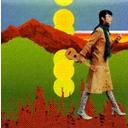 I first heard Tsuji Ayano (NPR feature here) in Osaka, killing time before catching the train. Her first EP had just come out on Kitchen Records, which had been previously known for more famed Japanese garage rock releases from the likes of the 5,6,7,8's. I gave pretty much everything on the listening booths a shot (including a CD of some car or stereo commercial (couldn't distinguish) of Ryuchi Sakamoto's), most of it being innocuous J-pop. Ayano stood out of the pack immediately, a girl and her ukulele. I bought the EP, thought it was a charming postcard-souvenir from a horrible trip, didn't think I'd ever hear any other music from Ayano, and somehow lost the EP somewhere along the way.
I first heard Tsuji Ayano (NPR feature here) in Osaka, killing time before catching the train. Her first EP had just come out on Kitchen Records, which had been previously known for more famed Japanese garage rock releases from the likes of the 5,6,7,8's. I gave pretty much everything on the listening booths a shot (including a CD of some car or stereo commercial (couldn't distinguish) of Ryuchi Sakamoto's), most of it being innocuous J-pop. Ayano stood out of the pack immediately, a girl and her ukulele. I bought the EP, thought it was a charming postcard-souvenir from a horrible trip, didn't think I'd ever hear any other music from Ayano, and somehow lost the EP somewhere along the way.It was a huge surprise for me, then, that Ayano blew up huge in Japan shortly after. In my first few weeks back in Asia following, Ayano was on the radio. Most of the time, this would've been a mistaken occurrence: Ayano's voice is that same little Japanese girl voice that is pretty typical of anything left of centre, particularly of the Shibuya stuff. But that ukulele is some of the most fucked up shit Asia's ever heard, and stuck out like a sore thumb immediately (it's perhaps telling that Ayano's rise to fame was due to soundtrack work for a Ghibli Studios cartoon).
It's odd that any music like that would make it to mainstream radio in North America, much less in Asia, where over-produced lite pop reigns supreme (somebody's got to feed new material to the karaoke bars). I headed over to the CD stores and sure enough, Ayano was huge, but in a kind of novel way akin to...well, akin to nothing. It's an oddity, to be sure.
I picked up this album (the translated title I swiped from an online CD store site; there's nary a word of English on the packaging), which is primarily a re-recording of the aforementioned EP on a major label. Most of the songs have been taken from their no-frills ukulele-only versions into more produced versions, complete with backing band, orchestra, etc. It's still charming, though not as charming: it approximates accessibility a little more, and thus the sheer eccentricity of the matter diminished. The better songs on the album, then, are those that repeat on the same: Ayano and her ukulele, sometimes backed up with a sole trumpet.
If Ayano can make it big in Asia, it's a topsy turvy world. Ayano's fame is a bit affirming, and should give every oddball in the world some hope. Will ukulele players make it big on American Idol? Probably not, but at the very least they'll be big in Japan.

No comments:
Post a Comment